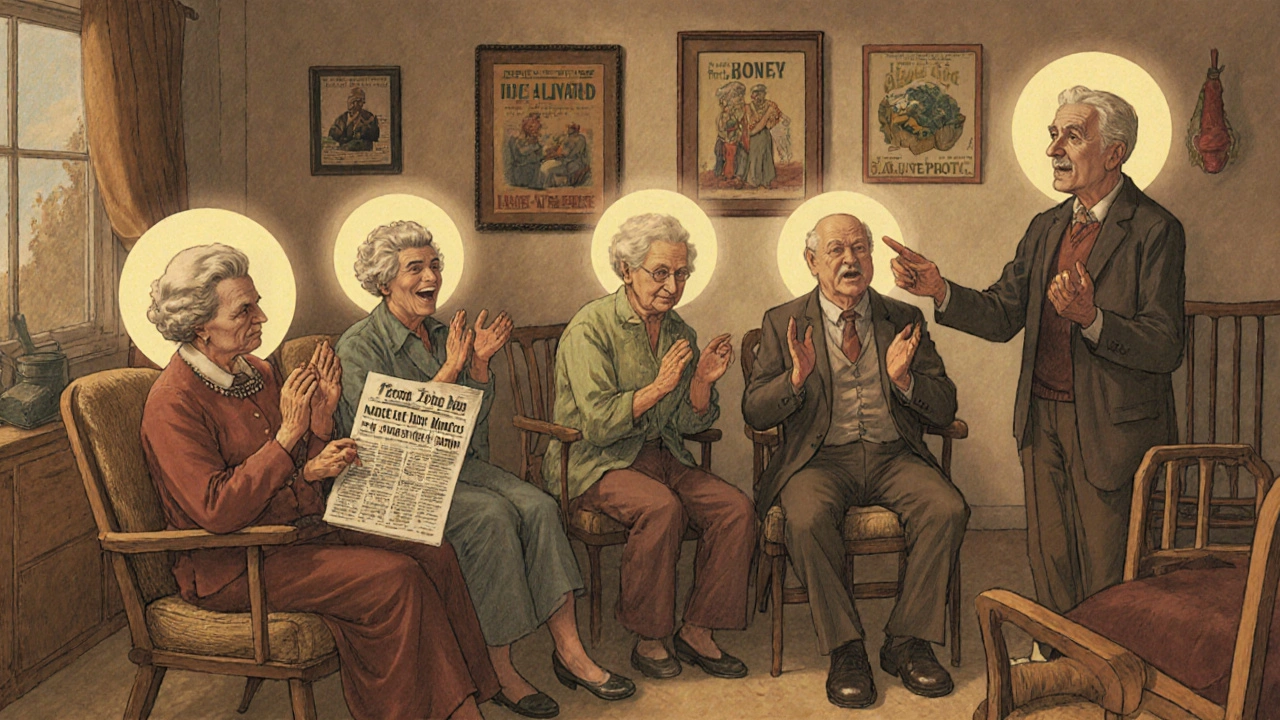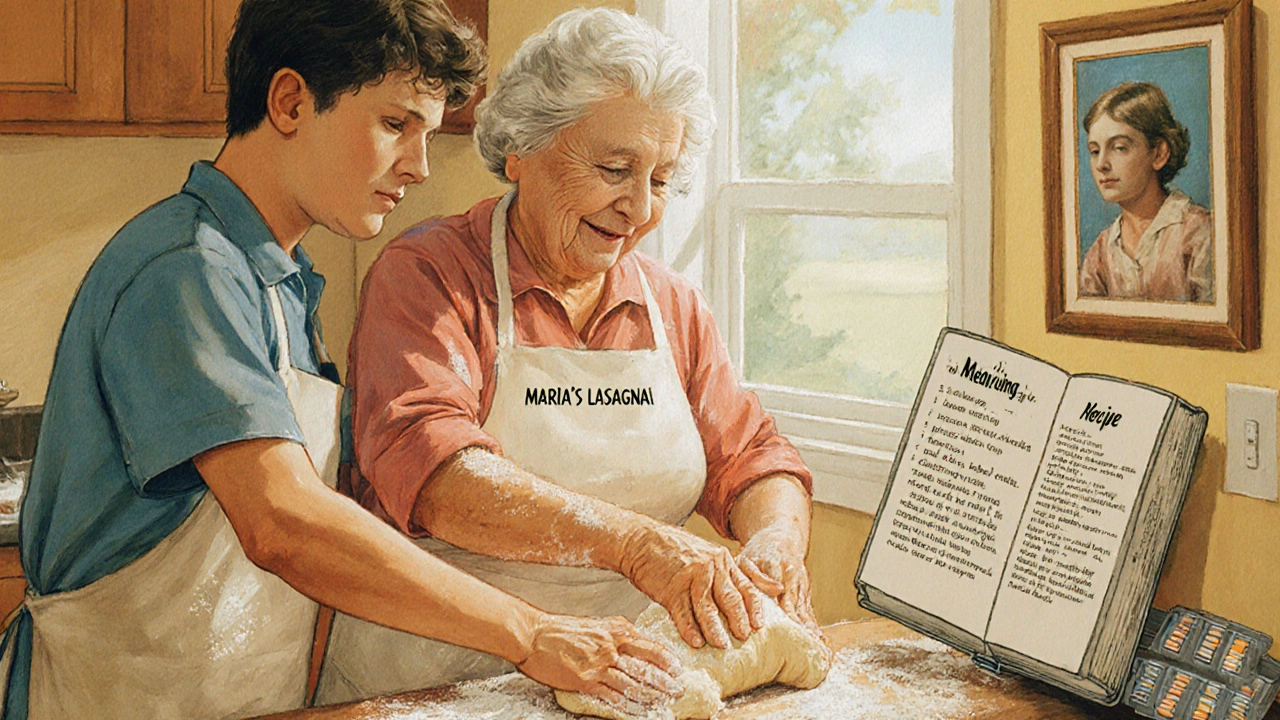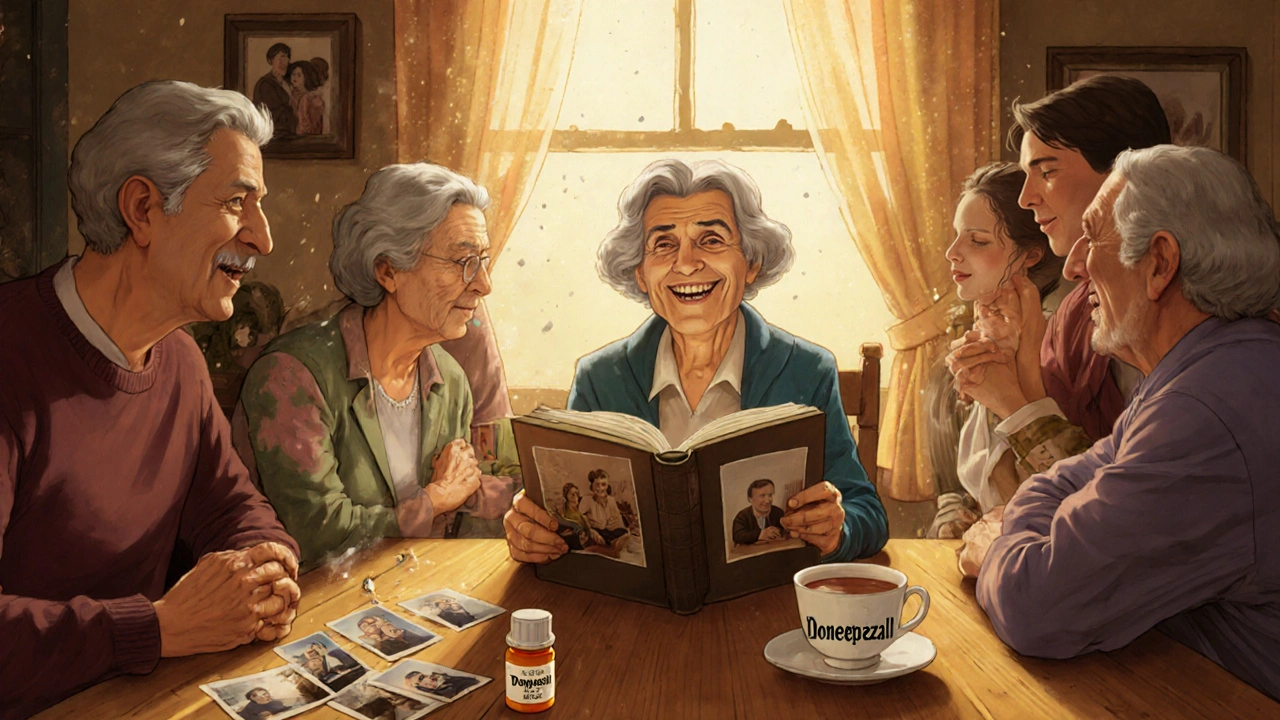When someone you love starts forgetting names, losing track of conversations, or struggling with daily tasks, it’s hard not to feel helpless. You might hear doctors mention donepezil - a pill often prescribed for Alzheimer’s - but that’s only half the story. The real breakthrough isn’t just the medication. It’s what happens when donepezil teams up with something simple, human, and deeply effective: cognitive stimulation therapy.
What donepezil actually does
Donepezil, sold under brand names like Aricept, is a cholinesterase inhibitor. That’s a fancy way of saying it slows down the breakdown of acetylcholine, a brain chemical critical for memory and learning. In Alzheimer’s disease, brain cells that produce acetylcholine die off. Less of this chemical means weaker signals between neurons. Donepezil doesn’t stop the disease. It doesn’t bring back lost memories. But it does help the brain use what’s left more efficiently.
Studies show that people taking donepezil tend to maintain their ability to perform daily tasks - like dressing, paying bills, or remembering appointments - for a few months longer than those who don’t. The effect isn’t dramatic, but it’s meaningful. For many families, those extra months mean more time for shared meals, familiar routines, and moments of connection.
Cognitive stimulation therapy isn’t just puzzles
Cognitive stimulation therapy (CST) is a structured, group-based program designed to keep the brain active. It’s not about solving Sudoku faster or memorizing lists. It’s about engaging in meaningful conversations, recalling personal memories, playing word games, discussing current events, or even singing old songs together. Sessions usually last 45 minutes to an hour, happen twice a week for at least seven weeks, and are led by trained therapists or caregivers.
Unlike passive activities like watching TV, CST demands active participation. A 2023 Cochrane review of 16 high-quality trials found that people with mild to moderate dementia who completed CST showed measurable improvements in memory, attention, and language skills. The benefits lasted for months after the program ended. What’s more, participants reported feeling less isolated and more confident.
Why combining them works better than either alone
Donepezil helps the brain’s wiring stay responsive. CST gives those wires something useful to do. Think of it like this: donepezil keeps the engine running. CST keeps the car on the road.
Research from the University of Sydney in 2024 followed 120 people with early-stage Alzheimer’s. Half took donepezil alone. The other half took donepezil and attended CST twice a week. After six months, the group doing both showed 37% better scores on standard cognitive tests than those on medication only. Their caregivers also reported fewer behavioral issues - less agitation, fewer repetitive questions, and more moments of clarity.
This isn’t coincidence. Neuroimaging studies show that CST increases activity in the prefrontal cortex - the part of the brain responsible for decision-making and social behavior. Donepezil boosts the chemicals that help those areas communicate. Together, they create a feedback loop: better brain function leads to more engagement, which leads to even better function.

Who benefits most from this combo?
This approach works best for people in the early to middle stages of Alzheimer’s or other types of dementia - especially those still able to participate in group settings. It’s less effective in late-stage dementia, where communication becomes extremely limited.
It also works better for people who’ve had some education or were socially active before their diagnosis. But that doesn’t mean others can’t benefit. Adaptations can be made: simpler games, one-on-one sessions, or using photos and music to trigger memories. The key is consistency, not complexity.
Family members often underestimate their role. You don’t need a degree in psychology to help. Asking your loved one about their childhood, looking through old photo albums, or even cooking a familiar recipe together counts as cognitive stimulation. These aren’t exercises - they’re moments of connection that happen to help the brain.
Practical steps to get started
If you’re considering this approach, here’s how to begin:
- Ask the doctor if donepezil is appropriate. It’s not for everyone - especially those with heart conditions or severe liver problems.
- Find a certified CST program. In Australia, organizations like Dementia Australia offer group sessions led by trained staff. Some community centers and aged care services also run them.
- Start small at home. Pick one activity per day: name three things from yesterday, describe a favorite vacation, or play a memory game using household items.
- Track progress. Note when your loved one seems more alert, talks more, or remembers a detail from earlier in the week. Small wins matter.
- Be patient. Improvements take weeks, not days. Don’t expect miracles. Look for steadiness - not sudden leaps.

What doesn’t work
Many families try brain-training apps or online memory games thinking they’re the same as CST. They’re not. Apps are isolated, silent, and rarely personalized. CST is social, responsive, and built around real-life experiences. One 2022 study found that people using commercial apps showed no measurable cognitive improvement after six months - even if they used them daily.
Also, don’t assume medication alone is enough. Donepezil works best when paired with mental activity. A person taking donepezil but sitting alone all day won’t get the same results as someone who’s engaged, talking, and participating.
Real-life impact: A family’s story
Maria, 78, was diagnosed with mild Alzheimer’s in early 2024. Her son, David, noticed she stopped joining family dinners. She’d sit quietly, nodding but not speaking. Her doctor prescribed donepezil. David signed her up for a local CST group run by Dementia Australia.
At first, Maria resisted. She didn’t want to go. But after the third session, she started laughing during a game about childhood holidays. Two months in, she asked to help make her famous lasagna again - something she hadn’t cooked in over a year. David didn’t see a cure. But he saw his mother come back - not fully, but enough to matter.
What comes next
Donepezil and CST aren’t a cure. But they’re two of the most evidence-backed tools we have right now to slow decline and preserve quality of life. New research is exploring whether combining them with physical activity, like walking or tai chi, could make the effects even stronger. Early results are promising.
For now, the message is clear: medication without engagement is incomplete. Engagement without support doesn’t last. Together, they give people with dementia more than time - they give them presence.
Can donepezil reverse Alzheimer’s?
No, donepezil cannot reverse Alzheimer’s disease. It doesn’t stop brain cells from dying or remove the plaques and tangles that cause the disease. Instead, it helps the brain use remaining chemicals more effectively, which can temporarily improve memory, attention, and daily functioning. The goal is to slow decline, not restore lost abilities.
Is cognitive stimulation therapy only for people in care homes?
No. CST is offered in community centers, hospitals, aged care facilities, and even through home visits. Many programs are designed for people living at home with family support. In Australia, Dementia Australia and local health networks provide group sessions that families can join without needing to move their loved one into a care facility.
How long do the benefits of CST last?
Studies show that cognitive improvements from CST can last up to six months after the program ends. Some people continue to show slower decline compared to those who didn’t participate. The key is to keep the brain engaged - even after formal sessions stop. Simple activities like talking, reading aloud, or playing cards can help maintain those gains.
Can I do cognitive stimulation at home without a program?
Absolutely. While formal CST programs are structured and evidence-based, everyday activities count too. Ask about childhood memories, look at old photos, play simple board games, sing familiar songs, or cook together. The goal isn’t perfection - it’s interaction. Consistency matters more than complexity. Even 15 minutes a day of focused conversation can make a difference.
Are there side effects to taking donepezil?
Yes. Common side effects include nausea, diarrhea, loss of appetite, muscle cramps, and trouble sleeping. These often improve after a few weeks. Less common but more serious risks include slowed heart rate and stomach ulcers. Always talk to a doctor before starting, especially if you have heart problems, asthma, or a history of ulcers. Never stop or change the dose without medical advice.
Is this combination suitable for vascular dementia?
Donepezil is sometimes prescribed for vascular dementia, though it’s not approved for this use in all countries. Evidence suggests it can help with memory and thinking in some cases, especially when mixed with Alzheimer’s pathology. CST is equally beneficial for vascular dementia and is recommended by dementia guidelines worldwide. The combination is often used off-label with good results, but should be discussed with a neurologist.
For families navigating dementia, the path forward isn’t about finding a magic solution. It’s about stacking small, proven tools - medicine, connection, routine - into something that holds together. Donepezil and cognitive stimulation therapy aren’t flashy. But together, they give people with dementia something rare: dignity, presence, and time.


Margaret Wilson
November 19, 2025 AT 13:48Donepezil + CST = the only thing keeping my dad from turning into a zombie who stares at the wall and asks if the TV is a person. 🙌 I swear, after 3 weeks of CST, he remembered my dog’s name. Not the dog. The NAME. I cried. Also, he called me ‘sweetheart’ without being prompted. That’s a miracle.
william volcoff
November 21, 2025 AT 02:38Let’s be real - donepezil’s effect size is tiny. The real win here is CST. The Cochrane review data is solid. But most families don’t know where to find certified programs. It’s not like you can just Google ‘CST near me’ and get results. Need better public health infrastructure for this. Also, side effects? Nausea is the least of it - the real cost is caregiver burnout.
Freddy Lopez
November 23, 2025 AT 01:58There’s a profound metaphysical truth here: cognition isn’t just neural wiring - it’s relational. Donepezil may enhance neurotransmission, but CST re-anchors the self in the social world. Memory isn’t stored in synapses alone - it’s co-constructed through dialogue, laughter, and the quiet act of being seen. The pill keeps the lights on. The therapy reminds you why you wanted to turn them on in the first place.
Jessica Engelhardt
November 24, 2025 AT 14:15Big Pharma paid for this ‘study’ lol. CST? Sounds like a fancy word for grandma bingo. Donepezil is just another SSRI knockoff. They don’t want you to know the real solution is ketamine or NAD+ infusions. Also, why are we even talking about this when the FDA is secretly approving AI brain implants next year? 🤫
Martin Rodrigue
November 25, 2025 AT 23:13While the Australian data is compelling, it is not generalizable to the Canadian healthcare context. Our publicly funded home care programs rarely include structured CST due to funding caps. Furthermore, the University of Sydney cohort had a high baseline cognitive reserve - a confounding variable not adequately controlled. One must exercise caution before endorsing this as a standard of care.
Sherri Naslund
November 27, 2025 AT 21:33my mom did cst and now she remembers my ex’s name but forgets my birthday… sooo… is this helping or just making her remember the wrong stuff? also why is everyone acting like this is new? my abuela did this with crossword puzzles in the 80s and she lived to 98. also i think the government is hiding the truth about mercury in vaccines and that’s why people forget stuff
Ashley Miller
November 28, 2025 AT 22:38They’re selling this combo because it keeps people alive longer. Longer = more social security payments. Also, did you know donepezil is made from a chemical derived from WWII nerve gas research? And CST? It’s just brainwashing with word games so you don’t realize you’re being controlled. The real cure is a raw food diet and sleeping in a copper pyramid.
Greg Knight
November 29, 2025 AT 21:53Look, I’ve been a caregiver for 8 years. I’ve seen it all - the denial, the anger, the breakdowns, the quiet moments when your loved one looks at you like they still know you. This combo? It’s not magic. But it’s the closest thing we’ve got. Start small. One walk. One song. One memory. Don’t wait for a program. Don’t wait for a prescription. Start today. Your person is still in there. You just gotta keep knocking.
rachna jafri
November 30, 2025 AT 03:31Western medicine is a scam. In India, we use turmeric, yoga, and chanting mantras - and our elders live longer, sharper, and happier. Why are we poisoning people with chemicals? CST? Sounds like a cult. My auntie talks to trees and remembers every wedding from 1962. No pills. No programs. Just love and soil. Maybe the answer isn’t in a lab - maybe it’s in the earth.
darnell hunter
December 2, 2025 AT 03:14Methodological limitations in the cited 2024 Sydney study are apparent. Sample size is inadequate, blinding was not implemented, and caregiver-reported outcomes introduce significant bias. Furthermore, the cost-benefit analysis of implementing CST at scale is unaddressed. Until peer-reviewed replication occurs in a controlled, double-blind RCT, this remains anecdotal.
Ankita Sinha
December 2, 2025 AT 15:57My grandma started CST last month and now she’s teaching me how to make samosas again. She forgot how to use the microwave but remembers the exact spice ratio from 1972. I didn’t think she’d ever cook again. This isn’t science - it’s soul. And honestly? I’m glad we didn’t just rely on a pill. We’re doing it together. Every day. Even if it’s just naming the colors of the curtains.
Kenneth Meyer
December 2, 2025 AT 23:41It’s fascinating how we reduce human cognition to neurochemistry. We treat memory like a hard drive that needs a firmware update. But memory isn’t data - it’s identity. Donepezil may slow the decay of synaptic signals, but CST rebuilds the narrative self. The person isn’t lost. They’re just waiting for someone to ask the right question.
Abdula'aziz Muhammad Nasir
December 4, 2025 AT 18:35In Nigeria, we don’t have access to donepezil, but we have our elders. They are our living libraries. We sit with them, tell them stories, and let them tell us theirs. No therapist needed. No pill needed. Just presence. If the brain is a garden, then love is the sun. Everything else is just noise.
Tara Stelluti
December 4, 2025 AT 21:35So… you’re telling me the answer to dementia is… talking? And a pill? I’m shocked. I mean, who knew? Next you’ll say sunlight helps with depression or that crying is good for your immune system. I’m just here waiting for the documentary where they reveal this was all a corporate ad campaign for Aricept and community centers.